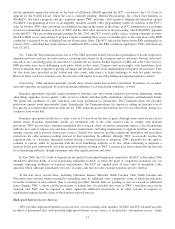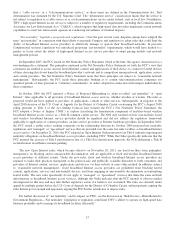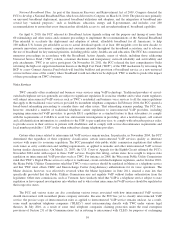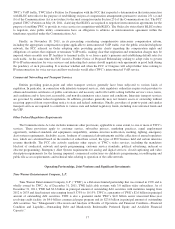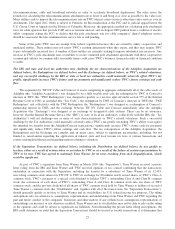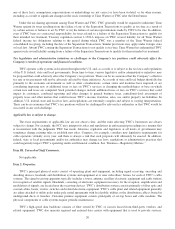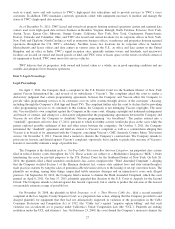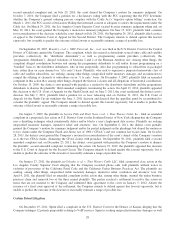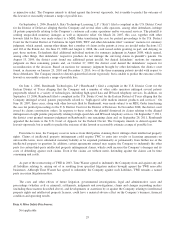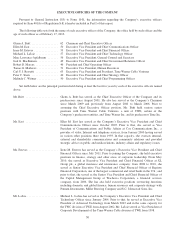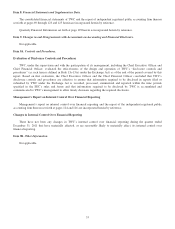Time Warner Cable 2011 Annual Report Download - page 31
Download and view the complete annual report
Please find page 31 of the 2011 Time Warner Cable annual report below. You can navigate through the pages in the report by either clicking on the pages listed below, or by using the keyword search tool below to find specific information within the annual report.reflect potential declines in fair value. See “Management’s Discussion and Analysis of Results of Operations and Financial
Condition—Critical Accounting Policies and Estimates—Asset Impairments—Indefinite-lived Intangible Assets and
Goodwill.”
TWC has incurred substantial debt, which may limit its flexibility and prevent it from taking advantage of business
opportunities.
As of December 31, 2011, TWC had $21.565 billion of net debt and mandatorily redeemable preferred equity. This
level of indebtedness may limit TWC’s ability to respond to market conditions, provide for capital investment needs or take
advantage of business opportunities.
Risks Related to Dependence on Third Parties
Increases in programming and retransmission costs or the inability to obtain popular programming could adversely affect
TWC’s operations, business or financial results.
Video programming costs represent a major component of TWC’s expenses and are expected to continue to do so
primarily due to the increasing cost of obtaining desirable programming, particularly broadcast and sports programming.
TWC’s video programming costs as a percentage of video revenues have increased over recent years and will continue to
increase over the next coming years as cable programming and broadcast station retransmission consent cost increases
outpace growth in video revenues. Furthermore, providers of desirable content may be unwilling to enter into distribution
arrangements with TWC on acceptable terms and owners of non-broadcast video programming content may enter into
exclusive distribution arrangements with TWC’s competitors. A failure to carry programming that is attractive to TWC’s
subscribers could adversely impact subscription and advertising revenues.
TWC may not be able to obtain necessary hardware, software and operational support.
TWC depends on third party suppliers and licensors to supply some of the hardware, software and operational support
necessary to provide some of TWC’s services. Some of these vendors represent TWC’s sole source of supply or have, either
through contract or as a result of intellectual property rights, a position of some exclusivity. If demand exceeds these
vendors’ capacity, they experience operating or financial difficulties, they significantly increase the amount TWC pays for
necessary products or services, or they cease production of any necessary product due to lack of demand, TWC’s ability to
provide some services may be materially adversely affected. Any of these events could materially and adversely affect
TWC’s ability to retain and attract subscribers, and have a material negative impact on TWC’s operations, business, financial
results and financial condition.
Risks Related to Government Regulation
TWC’s business is subject to extensive governmental regulation, which could adversely affect its operations.
TWC’s video and voice services are subject to extensive regulation at the federal, state and local levels. In addition, the
federal government has extended regulation to high-speed data services. TWC is also subject to regulation of its video
services relating to rates, equipment, technologies, programming, levels and types of services, taxes and other charges.
Modification to existing regulations or the imposition of new regulations could have an adverse impact on TWC’s services.
TWC expects that legislative enactments, court actions and regulatory proceedings will continue to clarify and, in some
cases, change the rights of cable companies and other entities providing video, high-speed data and voice services under the
Communications Act and other laws, possibly in ways that TWC has not foreseen. The results of these legislative, judicial
and administrative actions may materially affect TWC’s business operations.
Changes in broadcast carriage regulations could impose significant additional costs on TWC.
Although TWC would likely choose to carry the majority of primary feeds of full power stations voluntarily, so-called
“must carry” rules require TWC to carry some local broadcast television signals on some of its cable systems that it might
not otherwise carry. If the FCC seeks to revise or expand the “must carry” rules, such as to require carriage of multicast
streams, TWC would be forced to carry video programming that it would not otherwise carry and potentially drop other,
more popular programming in order to free capacity for the required programming, which could make TWC less competitive.
Moreover, if the FCC adopts rules that are not competitively neutral, cable operators could be placed at a disadvantage versus
other multi-channel video providers.
23



